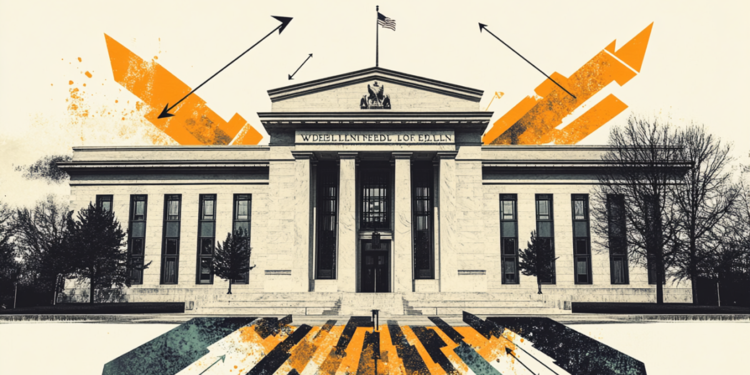The Biden administration’s fight to stop the financial contagion from the Silicon Valley Bank failure is an attempt to protect a resilient but still vulnerable economy and avoid serious political fallout.
The Treasury Department and federal regulators insisted there was no systemic risk to the banking system as a whole that could cause a repeat of the cataclysmic collapse of 2008 as they raced to open up Asian markets with measures to prevent a run on small or regional banks. from the USA.
They rolled out emergency measures on Sunday night (12th) that will secure SVB customers’ deposits.
Regulators also shut down Signature Bank, another institution that was threatening to collapse, and ensured that its clients made a similar deal.
US taxpayers will not fund either measure, officials said.
Quick action can mitigate immediate stress in financial markets. But it is too early to say whether the government will be forced to take more sweeping measures amid growing concerns about the health of the financial sector.
The suddenness of the crisis is exacerbating anxiety since SVB went bankrupt, seemingly out of the blue, within 48 hours.
Assurances from the White House and Treasury Secretary Janet Yellen that the overall banking system is sound set a new test of economic credibility for a government marked by dealing with high inflation.
President Joe Biden plans to address Americans this Monday morning (13) about his government’s emergency plan to contain the failure of the two banks.
“The American people and American businesses can be assured that their bank deposits will be available when they need them,” the president said in a statement.
“I am firmly committed to holding those responsible for this mess fully accountable and to continuing our efforts to strengthen supervision and regulation of larger banks so that we are not left in this position again,” he added.
The SVB drama invoked the ghosts and voter anger over bailouts given to wealthy bankers that caused the 2008 crash of greed and high-risk investments, the worst financial disaster since the 1930s.
Underscoring the extreme sensitivity of this story, an administration official told reporters that extraordinary moves to insure SVB client deposits through a federal insurance mechanism did not amount to a bailout.
“These are not taxpayer funds,” the official said, adding that the bank’s equity will not be sustained and bondholders will be “eliminated.”
But a political blame game was already erupting – a sign of how a dysfunctional and polarized Washington and a political system already stressed by the heated exchanges opening up to a new presidential election might struggle to deal with a truly looming financial crisis.
Some Republicans accused Biden of unleashing a multi-trillion dollar spending spree that caused high inflation and forced the Federal Reserve into a high interest rate strategy that made some banks more vulnerable.
Others criticized federal officials for their failure to prevent the SVB from collapsing in the first place, reigniting a long-standing feud over the government’s role in the economy.
Florida Governor Ron DeSantis, showing his determination to seize every issue to bolster a culture-driven narrative for his potential presidential candidacy, accused SVB executives of being more interested in diversity and inclusion training than high finance. .
Republicans also got some blame. the senator Bernie Sanders a Vermont independent and two-time Democratic presidential nominee, argued that the bank’s fate struck was the “direct result” of former President Donald Trump’s “absurd” loosening of financial regulations.
The danger faced by Biden
Any new economic shock would spell political disaster for a government already marred by multiple crises, especially as the president prepares to launch his long-awaited re-election campaign. It is crucial for Biden that he get the situation under control quickly.
He would face a disastrous political dilemma if worsening conditions forced a president – who has based his government on the upliftment of American workers and middle class – into a choice between bailing out wealthy bankers or letting the contagion spread.
Populist Republicans, like his potential 2024 election rival Trump, would also attack any scenario in which Biden is seen as helping wealthy tech investors in liberal California.
A financial crisis would be an opening for Republicans who have taken advantage of recent events, including a growing threat from China, an alleged southern border crisis and stubbornly high inflation, to try to convince voters that an aging president is tottering.
Growing political divisions over the SVB bankruptcy also bode ill for an impending showdown over the need to raise the government’s borrowing limit later this year.
Republicans are demanding billions of dollars in spending cuts that would destroy Biden’s agenda to do so. But the president warns that his intransigence could destroy US credibility and plunge the country and global economies into a self-inflicted crisis.
The struggle to avoid a crisis
The timing of the SVB crisis was auspicious, as it gave Yellen a weekend to align a stabilization plan with global markets closed.
Officials worked feverishly behind the scenes and briefed leaders and grassroots members of Congress.
Radical moves on Sunday night by Yellen, Federal Reserve Chair Jerome Powell and Federal Deposit Insurance Corporation Chairman, Martin J. Gruenberg were to prevent panicked investors from withdrawing funds from other banks, thereby threatening their survival, and also to allow companies with large deposits to make payroll and ensure their viability.
Throughout the weekend, Yellen sought to be a calm voice while simultaneously trying to prevent the situation from getting out of hand – both in its economic and political dimensions.
“Let me be clear that during the financial crisis there were investors and owners of large systemic banks that were bailed out, and we are certainly not looking for [fazer isso],” Yellen told CBS News on Sunday.
“And the reforms that have been put in place mean we won’t be doing that again,” he added.
Shalanda Young director of the White House Office of Management and Budget, also sought to ease the public’s concerns, insisting that the US banking system overall is “more resilient” now.
“It has a better foundation than before the financial crisis [de 2008]. This is largely due to the reforms implemented,” Young told CNN.
However, the risks of the SVB drama are still acute for Biden.
There is growing debate, for example, over whether the Federal Reserve should ease its tough interest rate strategy – with markets expecting another 50 basis point rise soon – to avoid further exposing vulnerable banks.
Sheila Bair a key banking regulator during the 2008 crisis, told CNN that the Fed should “take a break”.
California Democratic Rep. Adam Schiff echoed those concerns, telling the CNN that Congress needed to find out whether the central bank considered “the possibility that some institutions may not be able to handle such a rapid increase in rates.”
The debate underscores Biden’s congestion in the economy.
If the Fed stops the rate strategy, the inflation that is hammering voters and is politically corrosive for the president could get worse after some recent signs that it is subsiding. But if the Fed continues, the risks that its actions will hurt the wider economy and increase unemployment could increase.
As the SVB crisis escalated, so did the political stakes.
In his opening comments on the crisis, House Speaker Kevin McCarthy was moderate, apparently trying to contain the risk of a bank run in his home state of California, while talking about the asset quality of SVB clients, as one option was the acquisition of another larger bank.
“The government has tools to deal with this,” McCarthy told Fox. “So I wouldn’t make a living off someone putting something on Twitter. Let the government’s actions work here before anyone takes any position in their own bank.”
McCarthy also twisted the knife on Biden, days after he dismissed the president’s new budget as a multi-trillion dollar spending spree. And the speaker tried to exploit the SVB crisis to improve its position in the debt ceiling showdown. “High debt brings inflation,” he warned. “And what about inflation? You see with this bank, interest rates going up, where they’re stuck in bonds and such. We have seen the pain this causes American citizens.”
South Carolina Republican Representative Nancy Mace highlighted the difficulty McCarthy would face in mobilizing any congressional action if the crisis spreads and the administration asks for help.
“I would not support a bailout,” Mace told CNN’s Kaitlan Collins on the “State of the Union” show Sunday morning. She added: “We cannot continue bailing out private companies because there are no consequences for their actions.”
Fierce bipartisan resistance to bailing out the bankers is shared on both sides of the aisle, underscoring how the long-term consequences of unpopular efforts to avert the 2008 crisis are still weighing heavily on national politics, potentially constraining the government’s power to respond to any new large-scale catastrophe in the banking system.
Ahead of the government’s announcement on Sunday night, Democratic Representative Ro Khanna, who represents the California district where SVB was headquartered, led calls for the government to do more to make the institution’s customers whole, while firing bank executives.
“The bargain in our country with FDR has always been: investors and shareholders lose. I have no sympathy for the executives, nor sympathy for the people who own shares there. But depositors are protected,” Khanna said on “Face the Nation.”
Republican presidential candidates also sought a seat.
Former South Carolina Governor Nikki Haley warned: “It is not the responsibility of the American taxpayer to intervene. The age of big government and corporate bailouts must end.”
Meanwhile, DeSantis’ attempt to blame the bank’s Diversity, Equity and Inclusion programs was a reminder that, unlike Biden, a potential candidate has no responsibility for the wider economy.
Source: CNN Brasil
I am an experienced journalist, writer, and editor with a passion for finance and business news. I have been working in the journalism field for over 6 years, covering a variety of topics from finance to technology. As an author at World Stock Market, I specialize in finance business-related topics.







